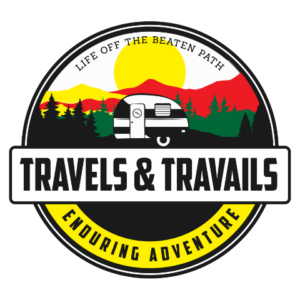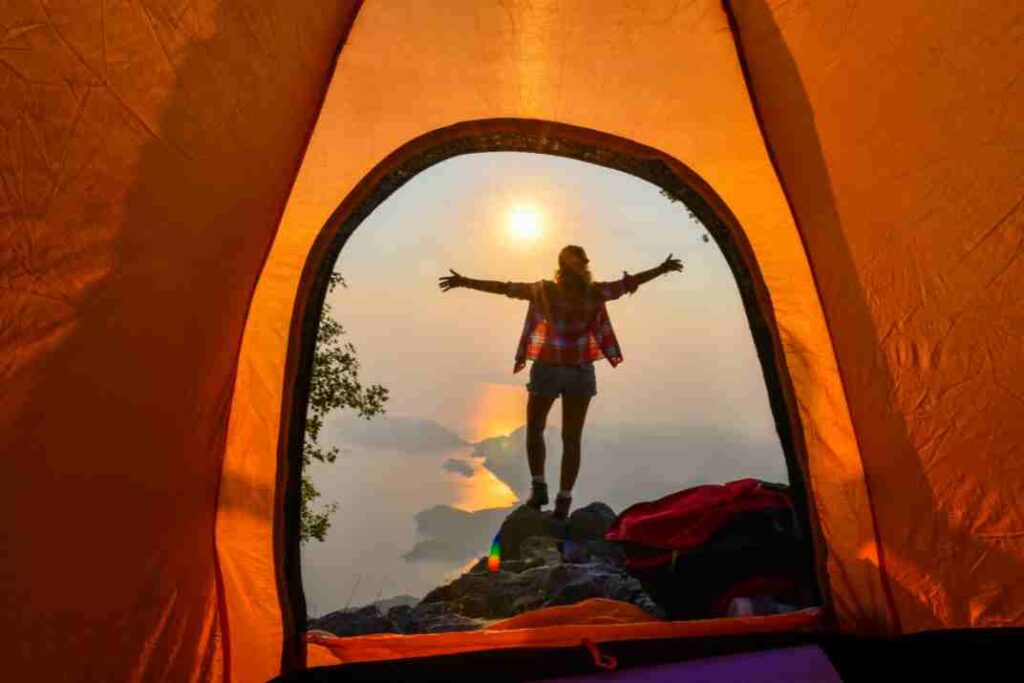
It’s a question that every first-time camper asks before they head out into the great unknown: is what they’re doing safe? What many campers find is yes, it is, but still, you can’t help but wonder. Is camping really the safest activity?
Camping is not altogether a risk-free activity. You could get hurt, stranded, killed by a person or wildlife, freeze to death, or starve to death. By packing the supplies you need, camping with others, and trusting in your intuition, you should be alright.
In this guide, I’ll go over the risks of camping and how to minimize those risks so you can enjoy time out in nature with less worry!
These Are the Risks You Face When Camping
Let me make it clear again; camping will never be 100 percent risk-free. I wish I could tell you that it is, but that would be dishonest of me.
Instead, what I want to do in this section is go over all the camping risks and then discuss how likely they are to happen. I hope this information puts your mind at ease a little!
Running Out of Food and Water
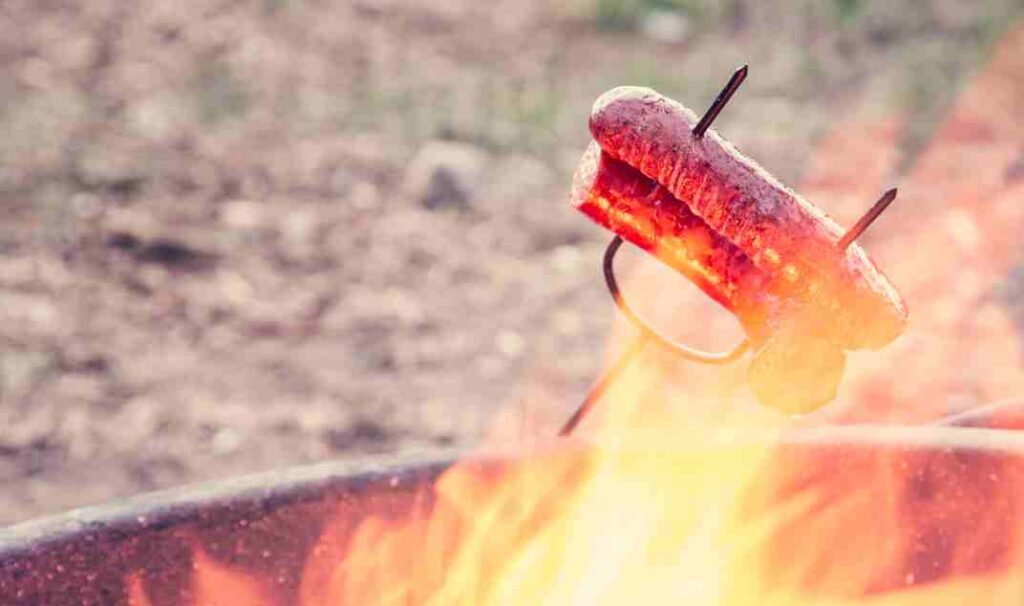
You had thought you’d brought enough food and water for your camping trip, but you exerted yourself a lot and ended up far hungrier and thirstier than anticipated.
You don’t want to starve, but if you don’t ration yourself, you’ll run out. Then it happens. That’s the last of your food supply and/or water supply.
This is a lot likelier to occur to newer campers than more experienced ones, as new campers aren’t quite sure how much food and water to pack.
Even if you did run out of food and water, this doesn’t always have to be the disaster scenario that so many perceive it as.
You can make many sources of water potable if you have a potable water filter.
If you don’t, then you can always call your trip short and head home early to refuel.
Avalanches
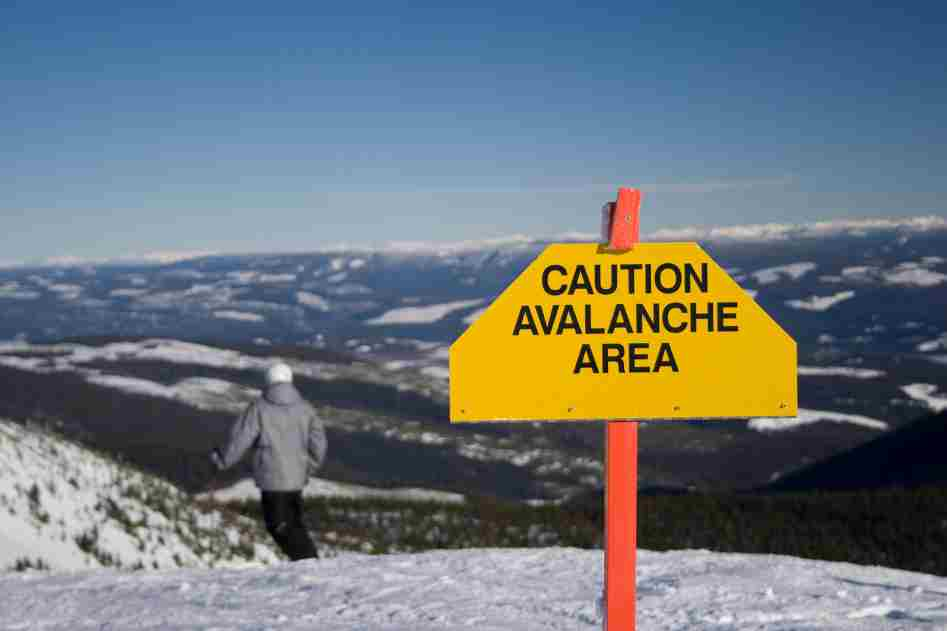
An avalanche occurs when significant amounts of soil, ice, rock, and snow falls rapidly down a mountain.
If you’re caught in an avalanche, you can easily be carried away and buried. Hopefully, someone is with you to witness the event (yet remain unaffected themselves), and they have the right tools to find you and dig you out.
Time is of the essence. While you’re buried, likely under feet of snow, you can suffocate and/or freeze to death.
According to National Geographic, up to 100,000 avalanches occur each year in the western United States alone. Over 150 people die every year from avalanches around the world.
Avalanches are thus very common in snowy regions, but if you camp in warmer conditions, then you don’t have to worry about an avalanche.
Falling Off a Cliff
Perilous cliffs are terrifying, but their summits offer the best sights around, so campers and hikers endure them.
Yet the number of people who actually take a tumble from a cliff is not that much. Slate, in a 2012 article, says that about 76 people fall per year.
These falls are likely going to be fatal, but that depends on how high you fall and how you land. You could even survive but get stuck, which is a fate worse than death depending on who you ask.
Cliffs will always be dangerous, but the risks should help you foster a healthy respect for cliffs so you’re not reckless when scrambling, rock climbing, or hiking.
Getting Lost
This can happen to even the most seasoned camper.
You headed out in a certain direction, and you were sure of where you were going when you first left.
Yet it’s been an hour and you could have sworn you’ve passed the same tree three times now. You can’t be 100 percent sure, but you know that tree too well.
That’s the thing about camping. When you’re lost in nature, there are no street signs, no road markers to guide you back. You can’t always rely on your phone either, as it might run out of battery.
More than likely, you don’t have cell service to begin with!
Getting lost is an incredibly common occurrence.
You can start arguing with others in your party, separate, and try to find your own way out. The clock is ticking, after all, as you don’t want to be stranded at night.
By carrying a compass and paper map on your person, if you do ever get lost, you should be able to find your way back at least.
Without those tools, it’s harder to get un-lost.
Getting Attacked or Killed by Wildlife
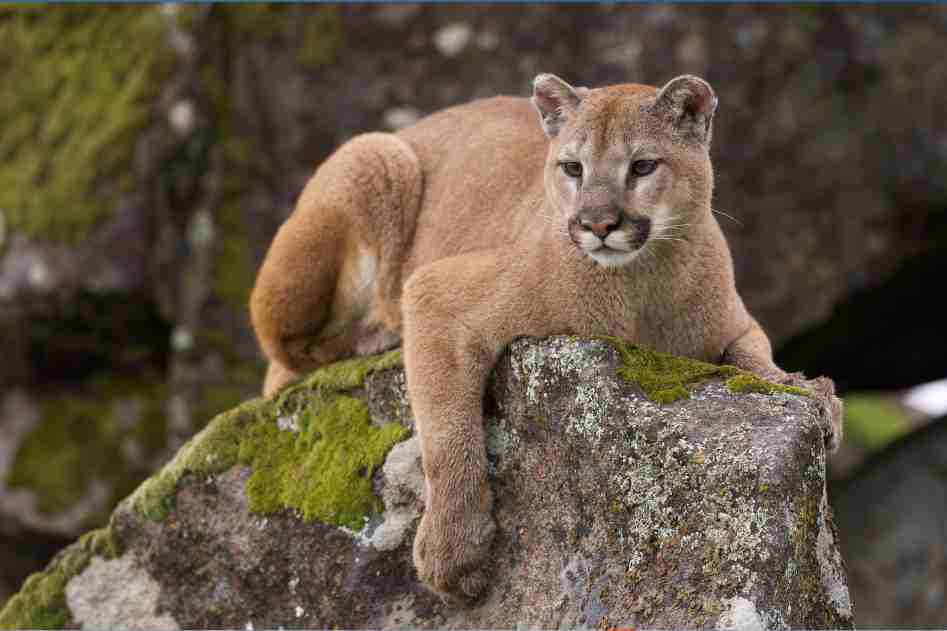
One of the perks of camping is getting closer to nature and all its inhabitants such as insects and animals.
That’s also one of the downsides, as you never want to get too close to a wild animal.
Not all animals will attack, as sometimes, you scare them enough that they retreat.
If the animal feels like you’re encroaching upon its territory, cornering or otherwise threatening it, or trying to threaten its young, then it will retaliate.
According to this Utah State University report, which has data from at least 2018, only eight people in the US die per year from wildlife bites and attacks.
That’s out of 47,000 people who are attacked, so attacks are pretty common!
I would say that wildlife attacks are one of the biggest risks of camping. Leaving food out and offering other enticing smells can sometimes lure in animals, so it’s not even necessarily enough to stay away.
Getting Attacked or Killed by a Person
Another animal to beware of when camping is humankind.
Since parks and campgrounds are remote locations where police aren’t readily lingering, some truly unsavory people use camping as an opportunity to attack and even kill another person.
These attacks aren’t always premeditated but can happen just the same.
An article from Crime Safety Security states that, between 2002 and 2007, the U.S. National Park Service reported 63 murders.
There were also 1,277 attacks, 37 kidnappings, 309 robberies, and 240 rapes.
And those are just what were reported or the ones that we know about! Think of how many times people go camping and just disappear off the face of the planet.
Fortunately, it’s not all that often, but it happens enough that you can’t ignore it or pretend that it’s not occurring.
In the next section, I’ll offer up plenty of tips that will help you camp safely if you’re starting to feel anxious about your camping trip.
Hypothermia
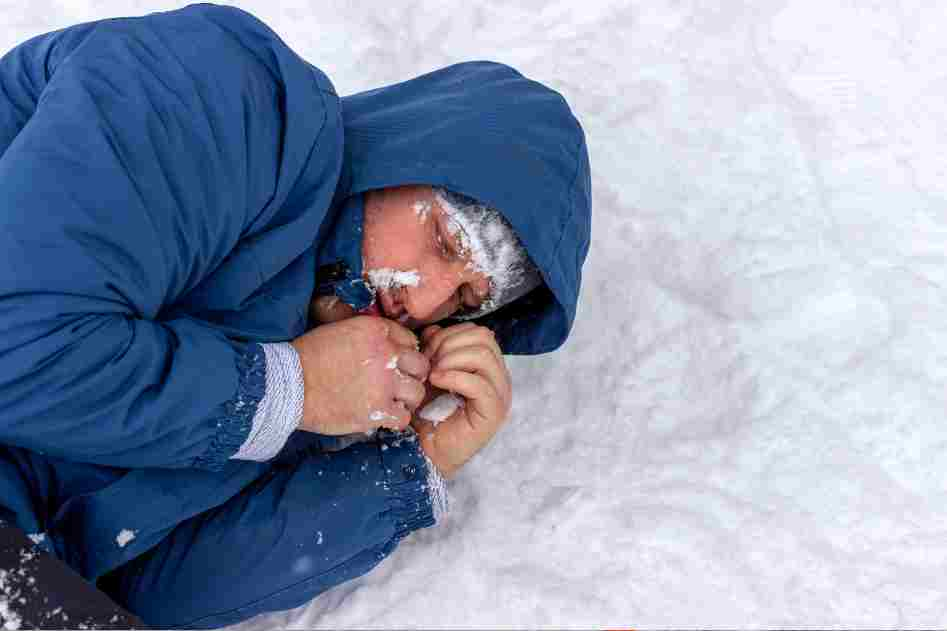
In very cold conditions, avalanches or otherwise, the risk of hypothermia shoots up.
Hypothermia occurs when your body cannot produce body heat as fast as it loses it. Your body temperature begins to drop, especially if you don’t get out of the cold (which isn’t always possible when camping).
Of course, hypothermia can happen outside of camping situations as well, but it’s likeliest in an everyday scenario to affect the elderly.
By avoiding wintertime camping, you can seriously slash your risks of hypothermia.
Wildfires
It used to be that wildfires were uncommon occurrences. However, with climate change continually affecting weather patterns and severity, that’s no longer the case.
The EPA states that the United States has experienced at least 70,000 wildfires every year since 1983, and that number could only grow in the future.
All forested land could succumb to wildfires.
You can always do your part to prevent wildfires.
Avoid starting a fire near any flammable materials or substances. Know how to put out a fire safely and fully. Don’t park on dry grass.
If a wildfire ever does occur, evacuate right away.
Heart Attack
This last camping risk is not necessarily specific to camping. You can have a heart attack anytime, anyplace, but since it can happen when camping, I wanted to include it.
The CDC notes that 805,000 Americans have a heart attack every year. Up to 605,000 are the first heart attack but 200,000 are second heart attacks.
Maintaining a healthy lifestyle and eating a nutritious, balanced diet will help you keep down your weight, which can reduce heart attack risk. You also should manage your cholesterol and avoid smoking.
How to Mitigate Camping Risks
To reiterate my point from before, camping will always carry some risks. What you do can go a long way toward lessening those risks, so here’s what I recommend.
Never Get Complacent
It doesn’t matter how many times you go camping, even to the same park or campground. Nature changes all the time.
You can’t assume that the bridge you always cross is safe, that that path you climbed the last time is still usable, or that the waters are okay to swim in.
The bridge can get rickety over time, the rocks can fall away, and current changes from the shifting seasons can make a river or lake unsafe.
Each time you approach elements that you’ve used and enjoyed before, you need to treat them like it’s the first time you’re seeing them. Do your due diligence.
Bring More Than You Need
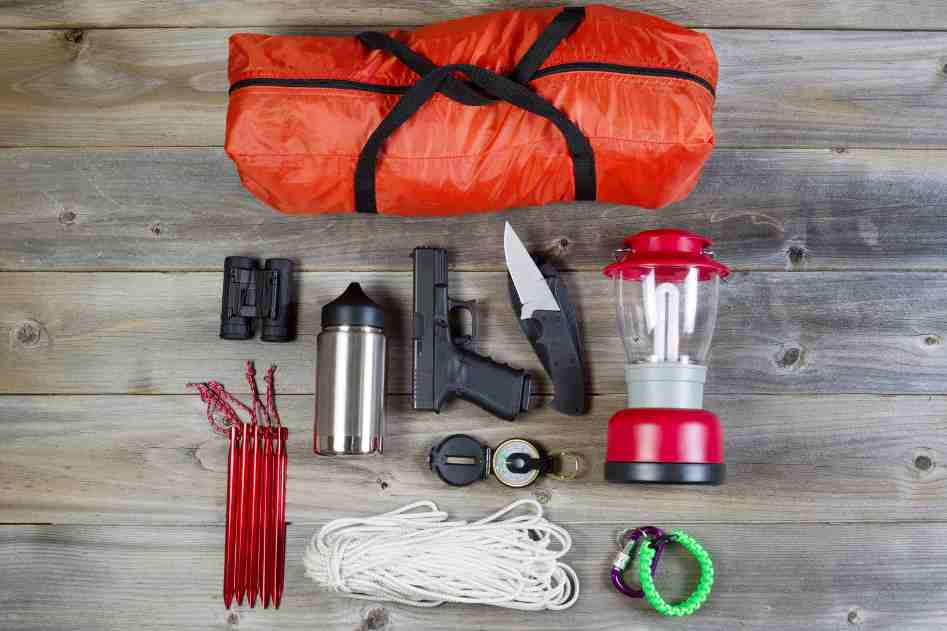
Whether for an overnight camping trip or a weeklong venture, it’s always better to have more supplies than fewer.
That doesn’t just go for food and water, although those should be a given.
I’m also referring to packing extra clothes, a backup map in case yours gets soaked or you lose it, and extra batteries for your flashlight or radio.
When you’re camping out in the middle of nowhere, many of these supplies are not readily available. As I said earlier, you can always make water potable, but you can’t produce batteries out of nature. It just doesn’t work like that.
Sure, a friendly camper might be willing to help you out and lend you some supplies, but you can’t count on the kindness of others.
The next time, you could go camping and no one is willing to help. It does happen!
You need to be in charge of your own supplies and pack more than what you think you will need.
That said, do not overload your backpack to such a degree that hiking is going to be painful and leave you exhausted.
If you’re looking for a way to save money camping, read the article we wrote.
Don’t Camp Alone
In so many cases, having another person in your party can save your life.
If you get injured or stranded, they can go get help for you or carry you back to camp. The presence of another person can also ward off potential human attackers.
Although not all animals are intimidated by groups of people, there is indeed power in numbers. The two of you can be louder and more imposing than you could be on your own, and that just might be enough to get an animal to leave you alone.
Only Venture Into Known Terrain
This rule goes for those campgrounds and parks you’ve visited as well as the ones you’re seeing for the first time.
There will always be adventures off the beaten path to tempt you. However, I would not recommend leaving these park-designated areas.
You never know where the path is going to bring you and where it will spit you out when you’re finished.
You could get lost along your route as well.
Just stick to the known trails and you’ll be a lot safer!
Bring a Compass and Paper Map (And Know How to Use Them!)

I mentioned before that a compass and paper map are your best friends when lost, and I really cannot stress that enough.
A compass can tell you which direction you’re in. If you know which direction you came from, then it’s easy enough to determine which route you should take from there.
Likewise, a paper map can guide you safely back to camp provided the map is well-marked and you’re in an area on the map that you can easily pick out.
Never camp without a compass and a map. That said, do be sure you know how to read a map and use a compass before you venture out for your trip or neither will do you any good.
If you’d like to find out how to survive your first camping trip, I wrote an article about that here.
Know How to Ward Off Wildlife
I wrote a whole guide on the most dangerous animals you might come across when camping, from buffalos to bears and big cats.
If you missed that article, the crux of avoiding wildlife attacks is this.
Most of the time, you should not make eye contact. Many animals take that as a threat and will accelerate their progress as they prowl toward you.
Try not to panic, as an animal can read your fear. You can and should make noise to scare the animal away and try to look imposing as well by broadening your stance. If you’re with someone else, stand together.
Never turn your back on a wild animal. Instead, slowly back away until the animal is out of sight. Don’t run either but walk calmly.
Listen to Your Gut
You know that weird feeling you can get about a person? That’s your intuition trying to communicate with you.
If you listen to it, then it will only get stronger, but by shutting it down and ignoring it, your intuition will become weaker.
If someone you see at a park or campsite has a bad vibe, then give them a wide berth. It doesn’t matter so much if they’re actually a bad person or if you only perceive them that way. You’re doing what’s right for you.
Conclusion
Camping is always at least a little bit risky. Even the most seasoned campers face these risks.
Avoidance of risks is the best way to stay safe and alive. The next best thing is to have a buddy who can help you.
I hope this article allows you to temper your fears with a big dose of reality. It’s okay to be a little scared when you camp, as that helps you stay vigilant. That said, above all else, you should have fun!
